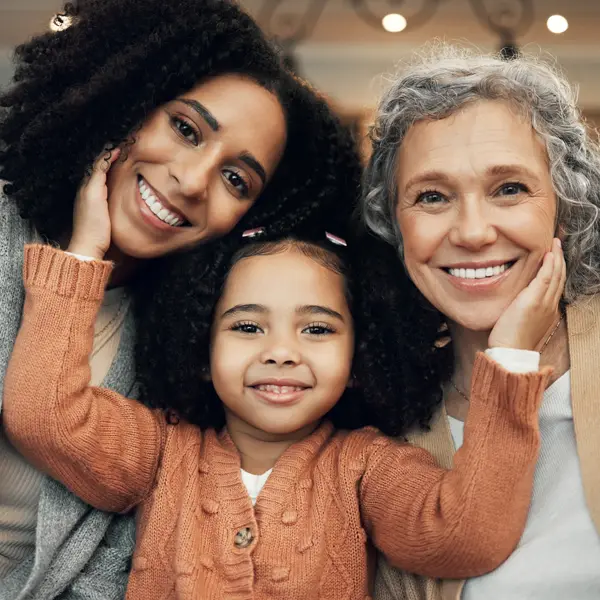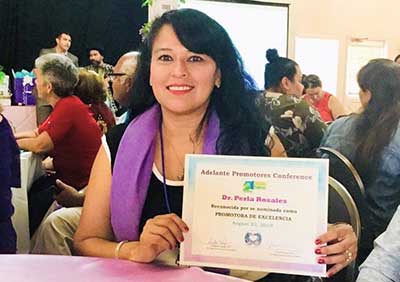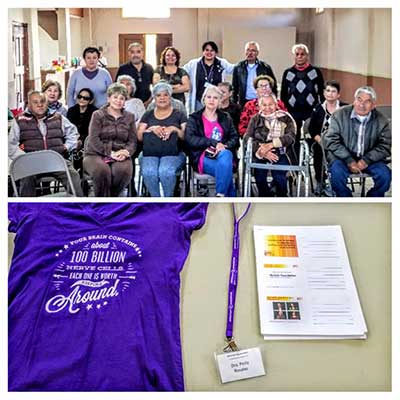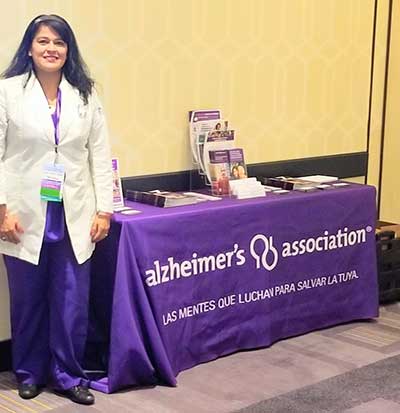
Make 2x the Impact Now
Make 2x the Impact Now
Our March Mission Match is underway, but not for long. Your gift by March 10 can go twice as far to advance research and help provide care and support for those living with Alzheimer’s and their caregivers.
Give NowPerla Rosales-Garay, M.D., Inspires Her Community Through Exercise and Alzheimer’s Education
In the community of South Bay, San Diego, Dr. Rosales, certified in nutrition in the United States, was educating her neighbors in the Hispanic/Latino population about how to prevent coronary heart disease and hypertension. “When I started teaching a painting course, I incorporated nutritional education through the products we snacked on during the class. I found that this simple act promoted eating more fiber and less sugar and fat, which is something people who took the class have carried on with in their everyday lives.” Those classes kept evolving as Dr. Rosales met more and more people in need.
 Dr. Rosales first became connected to the Alzheimer’s Association after speaking at a local conference. At the same time, her newest older adult exercise program, which incorporates coordination, balance and muscle strengthening, took formation. “I wanted to provide the older people in my community with Zumba® Gold classes, which recreate the original dance moves at a lower intensity,” Dr. Rosales says. “I provide these classes in San Diego and when I travel back to Mexico. Everything from dance to resistance exercise in the swimming pool is available to the public.” The program, intended for people age 65 and older, can even be modified for people who require a walker or wheelchair. Most of the classes Dr. Rosales teaches are free of charge, and these types of programs are a simple and sustainable way for people to get much-needed exercise, no matter their abilities. “You don’t need to be a bodybuilder to attend these classes. It’s an opportunity for seniors — which include people living with Alzheimer’s and dementia — to have a good time in a safe environment.”
Dr. Rosales first became connected to the Alzheimer’s Association after speaking at a local conference. At the same time, her newest older adult exercise program, which incorporates coordination, balance and muscle strengthening, took formation. “I wanted to provide the older people in my community with Zumba® Gold classes, which recreate the original dance moves at a lower intensity,” Dr. Rosales says. “I provide these classes in San Diego and when I travel back to Mexico. Everything from dance to resistance exercise in the swimming pool is available to the public.” The program, intended for people age 65 and older, can even be modified for people who require a walker or wheelchair. Most of the classes Dr. Rosales teaches are free of charge, and these types of programs are a simple and sustainable way for people to get much-needed exercise, no matter their abilities. “You don’t need to be a bodybuilder to attend these classes. It’s an opportunity for seniors — which include people living with Alzheimer’s and dementia — to have a good time in a safe environment.”Dr. Rosales believes that music is a big part of what makes the exercise classes so enjoyable. “Class attendees recall the songs and can perform the movements based on the music they have been learning week-to-week. They have a bond with their good memories and their sad memories and find joy in all of the music. I like to say that even their neurons are dancing!” She also has had a very positive response from both the people who take the class and their care partners. “Most attendees take the class four times a week, so there is an element of repetition, a regular activity that is part of their schedules. Everyone feels like a united part of a group through music and exercise.”
 The dance classes Dr. Rosales teaches have benefited the education of kids on the topic of Alzheimer’s as well. “When I teach education classes for young children, I always ask what everyone has learned after the course. All of the kids know the word “Alzheimer’s” even though it’s not an easy word to say. I want them to know about brain health and have compassion for people living with the disease. Some kids even join in the older adult class with people from their community who they have known for years. It’s a true coming-together of the generations.
The dance classes Dr. Rosales teaches have benefited the education of kids on the topic of Alzheimer’s as well. “When I teach education classes for young children, I always ask what everyone has learned after the course. All of the kids know the word “Alzheimer’s” even though it’s not an easy word to say. I want them to know about brain health and have compassion for people living with the disease. Some kids even join in the older adult class with people from their community who they have known for years. It’s a true coming-together of the generations. In addition to her exercise classes, Dr. Rosales has worked with the Alzheimer’s Association to present at local Alzheimer’s education conferences. She takes these opportunities to promote educational materials such as Las 10 Señales (10 Signs and Symptoms of Alzheimer’s in Spanish), as well as the 10 Ways to Love Your Brain. Providing these resources makes Dr. Rosales feel like a trusted member of her community. “Teaching people about Alzheimer’s gives me a certain amount of power over the illness. Education is power, and that is what I hope to pass on to my students, no matter their age.”
In addition to her exercise classes, Dr. Rosales has worked with the Alzheimer’s Association to present at local Alzheimer’s education conferences. She takes these opportunities to promote educational materials such as Las 10 Señales (10 Signs and Symptoms of Alzheimer’s in Spanish), as well as the 10 Ways to Love Your Brain. Providing these resources makes Dr. Rosales feel like a trusted member of her community. “Teaching people about Alzheimer’s gives me a certain amount of power over the illness. Education is power, and that is what I hope to pass on to my students, no matter their age.”Her advice for those facing the disease is simple: “Never lose hope.” With volunteers like Dr. Rosales working to educate and inform their communities, hope is very much alive.
Related articles:
Las 10 Señales (content in Spanish)
